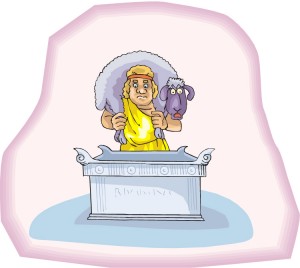This is a lengthy article that explores the concept of the blood atonement as it relates to the salvation of the sinner. The idea of atonement for sin is rooted in the Torah and is not simply a New Testament concept. Redemption through atonement is the foundation of the gospel message. Understanding this will strengthen your faith in the message of Yeshua’s atoning death on the cross.
Natan
In Numbers 31:50 we read, “We have therefore brought an oblation for YHVH, what every man has gotten, of jewels of gold, chains, and bracelets, rings, earrings, and tablets, to make an atonement for our souls before YHVH.” In a similar passage in Exodus 30:15–16, we read, “The rich shall not give more, and the poor shall not give less than half a shekel, when they give an offering unto YHVH, to make an atonement for your souls. And you shall take the atonement money of the children of Israel, and shall appoint it for the service of the tabernacle of the congregation; that it may be a memorial unto the children of Israel before YHVH, to make an atonement for your souls” (emphasis added). The question before us is this: Do these passages in the Torah imply that YHVH grants man absolution based something other than the shedding of blood, and by logical extension, does this call into question our redemption from sin through our faith in Yeshua the Messiah’s blood atonement?
The concept of atonement can be a confusing one. Some in rabbinic Jewish circles teach that the Torah (i.e., the first five books of the Bible) does not require the shedding of blood for atonement of one’s sin to occur. According to the above Scripture, this could appear to be the case. Before briefly discussing the subject of atonement, let us not forget the stern warnings of the Apostle Peter when he warned end-time Saints against false teachers who would lure people away from the simple truth of the gospel:
But there were false prophets also among the people, even as there shall be false teachers among you, who privily shall bring in damnable heresies, even denying the Lord that bought them, and bring upon themselves swift destruction. And many shall follow their pernicious ways; by reason of whom the way of truth shall be evil spoken of. And through covetousness shall they with feigned words make merchandise of you: whose judgment now of a long time lingers not, and their damnation slumbers not…. But these, as natural brute beasts, made to be taken and destroyed, speak evil of the things that they understand not; and shall utterly perish in their own corruption; and shall receive the reward of unrighteousness, as they that count it pleasure to riot in the day time. Spots they are and blemishes, sporting themselves with their own deceiving while they feast with you; having eyes full of adultery, and that cannot cease from sin; beguiling unstable souls: an heart they have exercised with covetous practices; cursed children, which have forsaken the right way, and are gone astray, following the way of Balaam the son of Bosor, who loved the wages of unrighteousness; but was rebuked for his iniquity: the dumb ass speaking with man’s voice forbad the madness of the prophet. These are wells without water, clouds that are carried with a tempest; to whom the mist of darkness is reserved for ever. For when they speak great swelling words of vanity, they allure through the lusts of the flesh, through much wantonness, those that were clean escaped from them who live in error. While they promise them liberty, they themselves are the servants of corruption: for of whom a man is overcome, of the same is he brought in bondage. For if after they have escaped the pollutions of the world through the knowledge of the Lord and Saviour Yeshua Messiah, they are again entangled therein, and overcome, the latter end is worse with them than the beginning. For it had been better for them not to have known the way of righteousness, than, after they have known it, to turn from the holy commandment delivered unto them. But it is happened unto them according to the true proverb, The dog is turned to his own vomit again; and the sow that was washed to her wallowing in the mire. (2 Peter 2)
In the Testimony of Yeshua (New Testament), there is no question that when the concept of atonement (i.e., to make ransom for or to cover over man’s sins) is presented it is Continue reading


